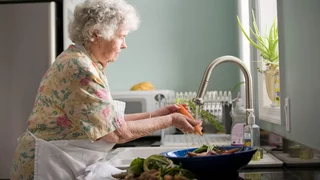
Reablement in Flanders: an innovative way of working in home care
Worldwide, there is an increase in the number of people living longer with one or more chronic conditions. This increases the number of people with long-term, complex care needs requiring home care. With the 'Reablement' concept, we help people to take care of themselves through a short home intervention of 8 to 12 weeks by one or more healthcare professionals aimed at maintaining and improving important daily and social activities of the client. After this, it is determined whether and how much home care someone needs.

Primary care in transition
The World Health Organization (WHO) emphasizes the importance of a primary care that… should be:
- proactive
- person-oriented
- community oriented
- holistic
- inclusive
Flanders is following suit, which means that the first line is in full transition.
New care concept 'reablement': patients learn to take care of themselves
However, the care offered in the home situation is fragmented with care providers who often work from a 'doing for' instead of a 'doing with' vision. Care goals are mainly determined on the basis of a diagnosis-oriented standard offer and less on the basis of the priorities, values and personal situation of the care recipients. Now is the right time to investigate new, promising care concepts.
Reablement is a much discussed and researched concept in the mainly Anglo-Saxon and Scandinavian international literature and fits perfectly with a strong, future-oriented first line. In short, reablement is helping people to take care of themselves. It is a short home intervention of 8 to 12 weeks by one or more healthcare professionals aimed at maintaining and improving important daily and social activities of the client.
Step-by-step recovery plan
In the rehabilitation process it is important that the professional, for example an occupational therapist, translates his treatment problems and wishes into concrete goals together with the client at the start of home care and evaluates these regularly. After 2 or 3 months, the reablement intervention stops and it is determined whether and how much home care is still needed.
- Referral & start home care
- Assessment
- Personal goals
- Customized intervention
- Evaluation 2, 4, 8, ... weeks
- At home with little or no help
Reablement effectiveness
Reablement is effectief gebleken zoals onder meer blijkt uit twee Scandanavische studies:
- After a period of reablement, the self-perception of performing activities and the satisfaction with that performance improved significantly in the elderly (Tuntland et al., 2015).
- A cost-effectiveness study (Kjerstad & Tuntland, 2016) showed that up to five years after the reablement, the elderly's need for home care was reduced and that they were less likely to receive an indication for intensive care in, for example, a nursing home.
Is the Flemish first line ready for reablement?
Artevelde University College is currently investigating, together with various stakeholders, whether the Flemish primary care context is 'ready' for reablement. Through qualitative and quantitative methods we go:
- to identify and analyze the experiences, wishes and ideas regarding current home care of clients with chronic conditions, caregivers, managers and referrers;
- find out whether there is support for the reablement method;
- explore whether the intervention in Flanders can solve the increasing care for the chronically ill.
The research project goes through the following steps:
- Literature study
- Focus groups with various stakeholders
- In-depth interviews with clients and their system
- Survey clients about being involved in meaningful activities
- Participatory observations of individual care situations
ARTICLES:
https://reable.auckland.ac.nz/what-is-reablement/evidence-for-reablement/
REFERENCES
Tuntland, H., Aaslund, M.K., Espehaug, B. et al. (2015) Reablement in community-dwelling older adults: a randomised controlled trial. BMC Geriatr 15:145. DOI 10.1186/s12877-015-0142-9
Kjerstad, E., & Tuntland, H. K. (2016). Reablement in community-dwelling older adults: a cost-effectiveness analysis alongside a randomized controlled trial. Health Economics Review, 6:15 DOI 10.1186/s13561-016-0092-8
Meet the team
Work with us?
Request customised research
We are happy to help you formulate your research question and approach.







